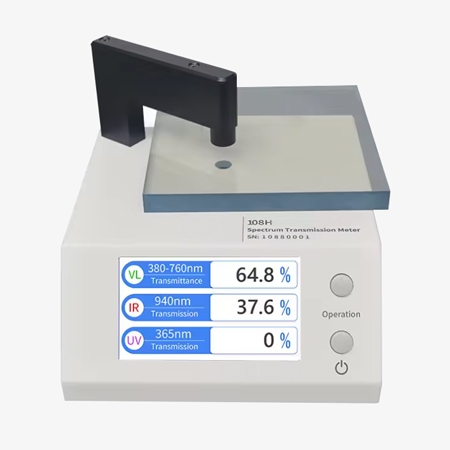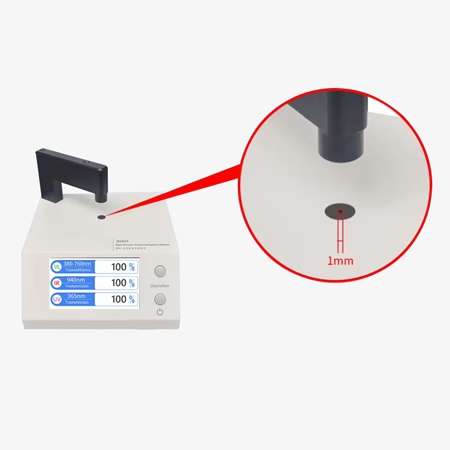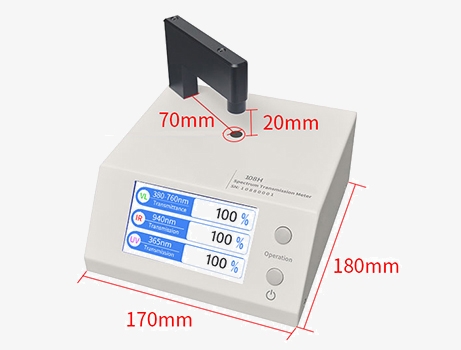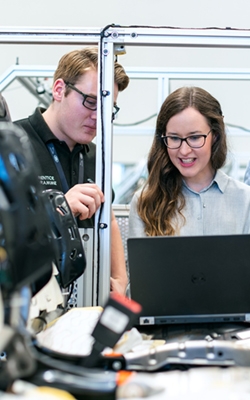High-accuracy VLT meter is a desktop instrument, that is exclusively designed for optical transmittance tests of various materials such as lens, glass, coating material, organic material paint, etc. The flat bench-top meter is available for placing various test samples. The test is fast and accurate. Once the test material is placed on the meter, the test results will be displayed immediately.

Large color LCD display for easy reading
- The vibrant color display ensures that all measurement data, including visible light transmission percentages, UV and IR values (if applicable), and additional indicators, are easy to read at a glance. The large screen format further improves visibility, reducing errors caused by misreading.
- With the transmission meter's large color display, the meter can showcase real-time data dynamically, providing immediate feedback on material performance and simplifying comparisons between different samples.
- The spacious screen layout allows simultaneous display of multiple parameters, such as visible light transmission, UV blocking rates, and infrared rejection, making the testing process more efficient and comprehensive.

The tint meter can measure ultra-small size materials
- 1mm test aperture, more accurate and convenient to measure small material data.
- The VLT meter is designed to accurately measure the visible light transmission of ultra-small materials, ensuring precise readings even for tiny samples, such as small glass fragments or narrow strips of film.
- Equipped with a focused measurement zone, the device can effectively handle materials with dimensions as small as a few millimeters, making it ideal for delicate or intricate applications.
Dimension

Applications
SISCO tint meter is used to measure the visible light transmission (VLT) of glass or window films, ensuring compliance with regulations and assessing performance. It is widely applied in the automotive industry for verifying car window tinting, law enforcement for roadside inspections, construction to evaluate building window films, industrial quality control for testing optical materials, and the solar energy industry to assess the effectiveness of tinted or coated glass panels in blocking UV and infrared radiation while optimizing visible light transmission. Its portability and precision make it an essential tool across various sectors.

Construction

Industrial Quality Control

Solar Energy Industry

Automotive Industry
| Model | SISCO-TM-108H |
| UV Peak Wavelength | 365 nm |
| IR Peak Wavelength | 940 nm |
| Visible Light | 380 nm-760 nm full wavelength, in line with CIE photopic luminosity function |
| Resolution | 0.10% |
| Measurement Accuracy | ±2% (colorless uniform transparent material, 0-90% transmittance) |
| Minimum Test Sample Size | ¢ 1mm |
| Display | 480px*72px color LCD |
| Power Supply | DC5V/1A |
| Dimension | 170mm*180mm*144mm (L*W*H) |
| Weight | 1600 g |
Q1: What is a tint meter?
A1: A tint meter is a device used to measure the Visible Light Transmission (VLT) of glass or window films. It determines the percentage of light that passes through a window, helping to assess whether the tint meets legal or industry standards. Tint meters are commonly used in the automotive industry to ensure compliance with regulations on window tinting, in law enforcement for roadside checks, in construction for evaluating window films, and in industrial quality control for testing tinted materials. These devices are portable, easy to use, and provide precise readings for various applications.
Q2: Can I use a tint meter on all types of glass?
A2: Yes, a Tint Meter can generally be used on most types of glass, including:
- Automotive windows: To measure the tint level of car windows.
- Architectural glass: To assess tinted or coated glass used in buildings.
- Glass with films or coatings: Tint meters can measure the combined transparency of the glass and any applied films, such as UV or reflective coatings.
However, for accurate readings, the glass surface should be clean and free from obstructions, and the meter should be properly calibrated. Some specialized tint meters can also work with laminated or double-glazed windows, but it's essential to check the device’s specifications for compatibility with specific glass types.
Q3: Are tint meters legal to own?
A3: Yes, tint meters are legal to own in most countries. They are commonly used by professionals, law enforcement, and businesses to measure Visible Light Transmission (VLT) of glass and window films. While owning a tint meter is generally legal, its use may be regulated based on local laws, especially for checking compliance with window tinting regulations. Always check local laws to ensure proper use.
Tips: Can a VLT meter measure tinted glass or films?
Yes, a VLT meter is specifically designed to measure tinted glass or films accurately. It determines the percentage of visible light passing through the material, making it an essential tool for assessing automotive window tints, building glass coatings, and other transparent or semi-transparent surfaces. The device ensures compliance with legal limits and performance standards, providing precise readings even for heavily tinted or multi-layered materials.
Modern VLT meters often feature advanced technologies, such as anti-interference capability and compatibility with curved or irregular surfaces, ensuring accurate measurements in diverse scenarios. Whether for professional use or personal assessments, a VLT meter is reliable for testing all kinds of tinted materials.
Thank you for buying industrial test and measurement equipment on SISCO.com, all products sold by SISCO and the partner cover a 12 months warranty, effective from the date of receiving the products.
What is covered?
SISCO is responsible for providing free spare parts, and free technical support to assist the customer to repair the defective products until the problem is solved.
What is not covered?
- Product purchased from anyone other than a SISCO store or a SISCO authorized reseller.
- Expendable parts.
- Routine cleaning or normal cosmetic and mechanical wear.
- Damage from misuse, abuse or neglect.
- Damage from use of parts other than SISCO approved.
- Damage from use outside the product’s usage or storage parameters.
- Damage from use of parts not sold by SISCO.
- Damage from modification or incorporation into other products.
- Damage from repair or replacement of warranted parts by a service provider other than a SISCO authorized service provider.
- Damage caused by the application environment not meeting the product usage requirements and the failure to perform preventive maintenance.

